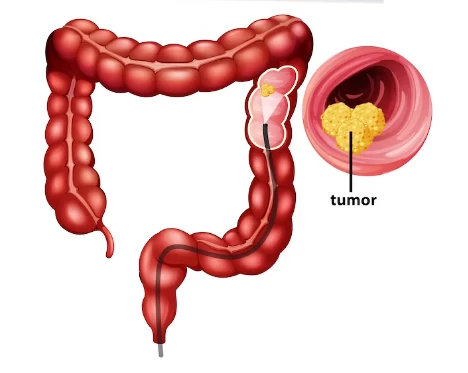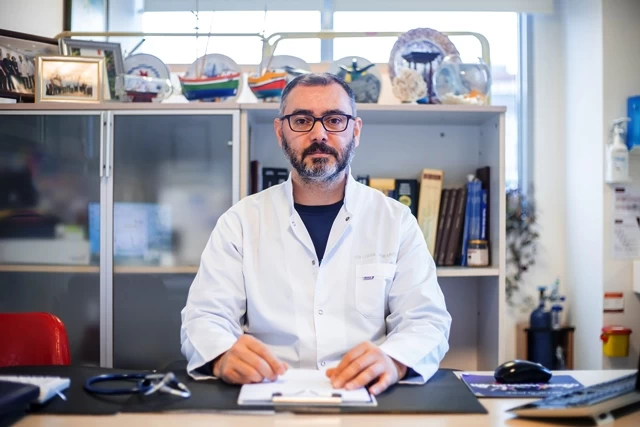
Diagnosis and Treatment of Colorectal Cancer
- Diagnosis and Treatment of Colorectal Cancer
- How is Colorectal Cancer Diagnosed?
- What Are the Treatment Methods for Colorectal Cancer?
How is Colorectal Cancer Diagnosed?
Various medical methods and tests are used to diagnose colorectal cancer. These diagnostic methods are used to confirm the presence of cancer, evaluate the size and extent of the tumor, and determine the treatment plan. The main methods used to diagnose colorectal cancer are as follows:
- Rectal Examination: The doctor can examine the inside of the rectum by finger to detect abnormal growths or lesions.
- Colonoscopy: This method is the most commonly used diagnostic method. The inner surface of the colon is examined using a flexible tube (endoscope). The endoscope has a camera at its tip, allowing the doctor to visualize tumors and polyps. Colonoscopy also allows for biopsy procedures. Biopsy involves taking samples of suspicious tissues for laboratory examination.
- Fecal Occult Blood Test: This is a test used to detect the presence of occult blood in the stool. Conditions like colon cancer can lead to the presence of occult blood in the stool. If this test yields a positive result, further examination may be necessary.
- Imaging Tests: Imaging methods such as computed tomography (CT) and magnetic resonance imaging (MRI) are used to assess the size, extent, and impact of the tumor on nearby organs.
- Tumor Markers: Through blood tests, the levels of specific substances produced by cancer cells (e.g., carcinoembryonic antigen - CEA) can be measured to assess the presence of cancer or response to treatment.
- Biopsy: Tissue samples taken through endoscopic methods or during surgery are examined in the laboratory. This is important for determining the type and aggressiveness of the cancer.
The diagnostic process may vary depending on the individual's condition. Your doctor will choose the most appropriate diagnostic method based on your symptoms and risk factors. Early diagnosis is crucial to increase the chances of successful treatment.

What Are the Treatment Methods for Colorectal Cancer?
The treatment of colorectal cancer is determined based on factors such as the stage of the tumor (how advanced it is), the size of the tumor, its spread, and the patient's overall health. The treatment plan may require a multidisciplinary approach and typically involves a combination of surgery, chemotherapy, radiation therapy, and targeted therapies. Here are the treatment methods for colorectal cancer:
- Surgical Intervention: Surgery is the most commonly used method for treating colorectal cancer. Surgical procedures are performed to remove the tumor and the surrounding healthy tissue to control the spread of cancer. The type of surgery may vary depending on the location, size, and stage of the tumor. In some cases, permanent or temporary colostomy (an opening to the outside of the intestine) may be created for colorectal cancer patients.
- Chemotherapy: Chemotherapy is a drug treatment used to kill cancer cells or slow their growth. Chemotherapy can also prevent the cancer from spreading to other parts of the body.
- Radiation Therapy: Radiation therapy aims to target cancer cells using high-energy rays. It is used for tumors in the rectum. Radiation therapy can help shrink the tumor before surgery or can be used as post-surgery treatment.
The treatment plan is customized based on the patient's overall health, tumor characteristics, and patient preferences. As with any cancer, the primary goal in colorectal cancer treatment is to eliminate the cancer. The earlier the cancer is detected, the higher the chances of success with surgery and other treatments. Colorectal cancers that have spread to the liver can also be treated with surgery. In such cases, chemotherapy may first be needed to control the disease in the body. Surgery may be planned to shrink the tumor, alleviate symptoms, and improve the patient's quality of life.
Cancer surgery requires expertise and experience. Before cancer surgery, several medical specialties need to be involved in treatment planning. Cancer surgery is performed by specialized surgeons in hospitals that have departments such as surgical oncology, medical and radiation oncology, gastroenterology, and interventional radiology, and patients tend to have longer survival rates in these specialized settings.






